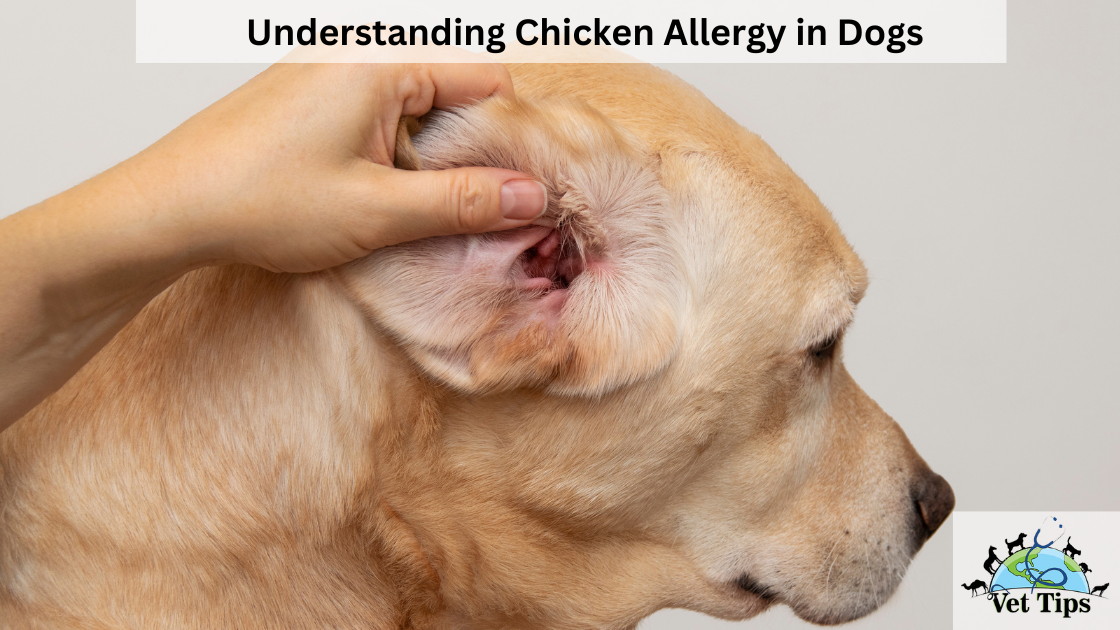When it comes to the well-being of our four-legged friends, it is imperative that we are aware of any and all potential health issues that might impact them. One such problem is that some dogs are allergic to chicken. This article will go into the subject of Chicken Allergy in Dogs, giving you a complete explanation of what this allergy comprises, how it may be recognized, and the actions that you can take to treat it. Let’s investigate this topic together, shall we?
The term “chicken allergy” refers to a condition in which a dog’s immune system has a negative reaction to proteins that can be found in chicken products. Our canine friends experience discomfort as well as health problems as a result of this immunological reaction, which generates a variety of symptoms.
Dogs who are allergic to chicken may display a variety of symptoms including itching, skin irritation, hair loss, gastrointestinal disorders such as vomiting and diarrhea, and even respiratory concerns. The severity of these symptoms might vary greatly from one dog to the next.

Navigating Chicken Allergies in Dogs
Acquiring the knowledge and resources necessary to treat chicken allergies in dogs is a crucial part of being a good pet owner. When a dog’s immune system has an unpleasant reaction to the proteins present in chicken products, the dog is said to have a chicken allergy. This immune reaction can result in a wide variety of painful symptoms, such as itching, skin irritation, hair loss, gastrointestinal difficulties, and respiratory problems. It is of the utmost importance to obtain a correct diagnosis of this allergy by expert veterinary evaluation. This evaluation may comprise allergy testing such as skin tests or blood tests.
Understanding, and Care
After a diagnosis has been made, the only way to treat a dog’s chicken allergy is to remove all chicken and foods derived from chicken from his or her diet. This is something that may be accomplished through the consumption of specially developed hypoallergenic dog diets. These feeds make use of unconventional protein sources in order to reduce the likelihood of allergic responses occurring.
Even though some people who own pets prefer to cook their pets’ food at home, it’s important to get professional advice to make sure the meals include a healthy mix of nutrients. The changeover to other sources of protein needs to be carried out in stages, and it is essential that you keep an eye on your dog’s development. You will be able to give your canine partner a life that is both pleasant and healthy if you take appropriate action to treat chicken allergies.
Diagnosing Chicken Allergy
You should talk to a vet if you have any reason to believe that your dog has an allergy to chicken. They may do allergy testing on your dog, which may involve skin tests or blood tests, in order to narrow down the potential allergens that are responsible for his response. It is essential to consult a medical practitioner in order to receive an appropriate diagnosis.
Managing Chicken Allergies
After receiving a diagnosis, the first step in treating a chicken allergy in your dog is to remove all chicken and foods derived from chicken from their diet. Consider feeding your dog hypoallergenic food, which has all the necessary nutrients but none of the allergic proteins. Always get the advice of your veterinarian before making any nutritional changes.
Comparative Analysis: Chicken Allergy vs. Other Allergies
It is helpful while discussing chicken allergies in dogs, to compare them to other common allergies that dogs could encounter. The following table will illustrate some important differences:
|
Allergy Type |
Symptoms |
Common Triggers |
|
Chicken Allergy |
Itching, skin inflammation, gastrointestinal issues |
Chicken proteins |
|
Grain Allergy |
Itchy skin, digestive problems |
Wheat, corn, soy |
| Environmental Allergy | Sneezing, itching, watery eyes |
Pollen, dust, mold |
Frequently Asked Questions
Can dogs develop chicken allergies over time?
It’s possible for a dog to acquire allergies at any point in their life, thus the answer is yes. A dog that used to be able to eat chicken can all of a sudden acquire an allergy to the food. Maintain vigilance for any changes in either your behavior or your health.
Are there breeds more prone to chicken allergies?
Although every dog breed has the potential to develop an allergy to chicken, certain breeds may be more likely to do so owing to genetic predisposition. There is a possibility that some breeds, such as Labrador Retrievers, Bulldogs, and Golden Retrievers, have a higher risk.
Can homemade diets help manage chicken allergies?
Although homemade diets provide you with more control over the foods that go into them, it can be difficult to ensure that they are nutritionally enough. It is essential to confer with a veterinarian or a veterinary nutritionist in order to guarantee that your dog is getting the correct nutrients and avoiding allergies.
Is it possible for dogs to outgrow chicken allergies?
It’s a long shot, but it’s possible that some dogs will outgrow their allergies. However, it is best to operate with the assumption that the allergy will persist throughout their entire life and to adjust their diet appropriately.
Are there alternative protein sources for dogs with chicken allergies?
Certainly, there are a variety of other options available, such as fish, turkey, duck, or deer, all of which are excellent sources of protein. Always introduce new proteins in a progressive manner and make sure your veterinarian is there during the process.
Final Words
It is critical to a dog’s health that their chicken allergy be properly diagnosed and treated. You will be able to guarantee that your four-legged pal leads a happy and healthy life if you are aware of the symptoms, if you seek a professional diagnosis, and if you make dietary modifications. Keep in mind that your dog’s veterinarian is the finest resource you have at your disposal for controlling your dog’s allergies and improving his general health.
Tell us in the comments, how you like our article “Understanding Chicken Allergy in Dogs”
For similar posts like this, click here.
For the source file, click here.




